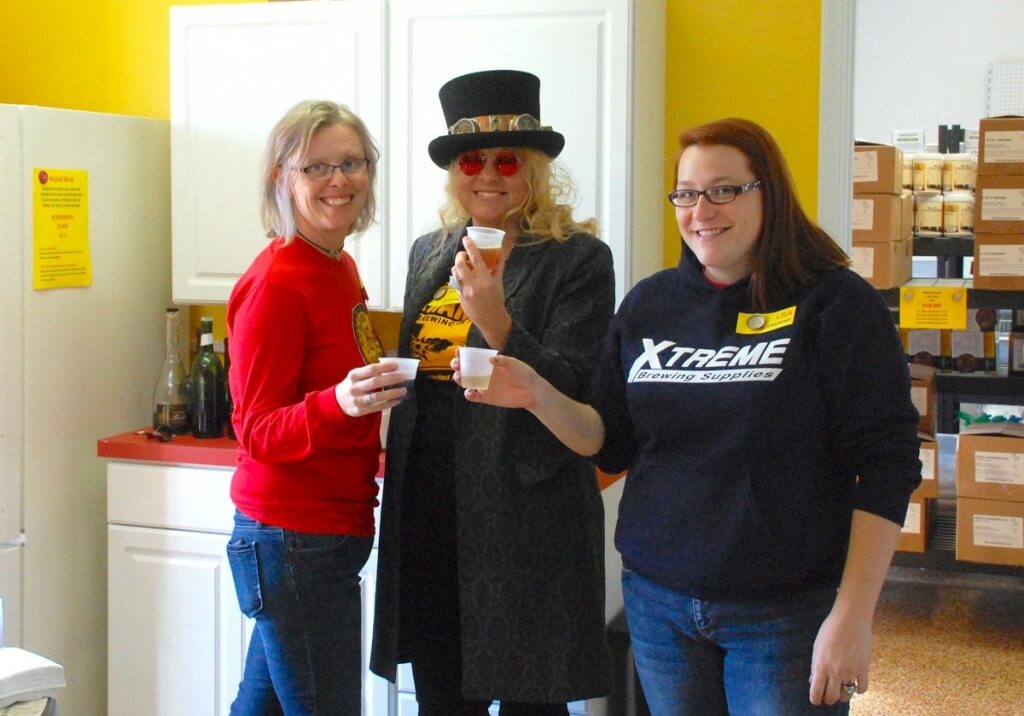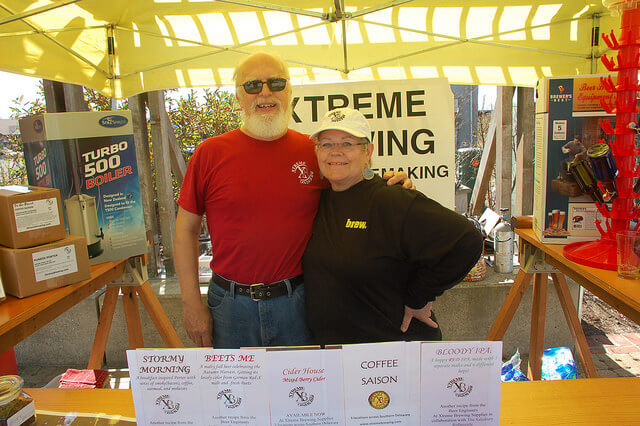This weekend at Xtreme Brewing in Laurel, Del. there is a learning to brew class. It is free and includes samples of some of the beers you can make. You should go. If you’re still not convinced, let me take you through it. If you’re already convinced, the class is 2 p.m Saturday, March 12. It takes about to hours start to finish. There are snacks.
Doug and Patti Griffith own Xtreme Brewing have been helping people learn to brew beer for a little more than 20 years. During that time many or most of the great brewers in the area have wandered in to one of the three Xtreme Brewing shops in the region (Lewes, Millsboro and Laurel) to see what this whole homebrew thing was about. Hundreds more have wandered in and learned and picked up a hobby for life. There are tons reasons you should start learning to brew. Since March is Women’s History Month I’ll start with the ladies.

Brewing isn’t a guy’s club
As we spoke about on this week’s Beer with Strangers Podcast, women are a target demographic for the craft beer industry because they are seen as “not liking” craft beer. This is silly, a little insulting and not true.Women under 34 account for 15 percent of beer sales by volume (guestimates that support my claim say that women account for something closer to 40 percent). On the other hand, 98 percent of people are bored by statistics. Moving on.
As someone who as been fortunate enough to attend a lot of the homebrew events, let me assure you that they are not just women-friendly, there isn’t much thought taken about the demographics except for by people like me. As much as we’d like to think differently, inquisitive and creative people take to brewing naturally. Creativity isn’t gender specific.
Homebrewing is social in the best way
I’m not checking statistics on this, I’m just going to say that a lot of scientists and science-y types and a lot of mechanic-y types homebrew. There is ample opportunity to create and and solve problems and it is a fun, hands on hobby that, even when it doesn’t go as you like, results in beer. There is always something to talk about among homebrewers that is not religion or politics or sports or whatever those people who stopped inviting me to cocktail parties talk about. Homebrewers talk about beers they’ve tasted, problems they’ve solved and beers they want to make. Homebrewing is a built-in conversation starter and self-supporting topic. Also, there’s beer around when you’re having these interactions.
Every time there is a break in the weather, and especially once the spring starts, the homebrewers on my social feeds start posting photos of their brewing equipment set up outside, or photos of them brewing in the garage with the doors open. Many if not most brew all year, but fair weather seems to be a contagion and those who took the winter off to get back on the horse. All the social sharing brings me to another point…

Home brew clubs have the best people
You can find out everything you need to know about homebrewing on the Internet, as long as you don’t mind being on the Internet. The culture in a homebrew shop, or at a homebrew club is so far superior to that of any online community as to be cartoonishly self-evident. The newest club members and the most novice brewers are as welcome in these clubs and at homebrew events as the founders and longtime members. There are disagreements about how to solve problems but there’s a general agreement that there is more than one best practice. Also, trolls are afraid to be around normal people.
Home brewing makes you a better beer drinker
As with any specialized knowledge, the more you know the better you appreciate what goes on behind the scenes. From the very time you brew your first beer you get a sense of how the tastes work. The aroma of boiling malt is distinctive. Once you’ve identified it, you can get a sense of how its going to taste as beer. Tasting unfermented beer, and dipping in occasionally as the beer ferments, is the Tai Chi of taste. Practice tasting beer over time and when you do it quickly the process still happens slowly.
Better, you learn to appreciate well made beer that you don’t like and distinguish it from poorly made beer that you don’t like. As with any other art, having discerning knowledge helps you to enjoy what you enjoy more deeply because you can put better words to the experience. It’s the difference between repeating what you’ve heard and understanding what you’ve learned.

Homebrewing give you access to great, inexpensive beer
Homebrewing can be as expensive a hobby as you want it to be, but once you get the initial setup the only expense you have is ingredients, electricity and water. For between $40 and $60 per five gallon batch you’ll make more than 50 bottles of craft beer. Many homebrewers have taps right in their homes to reduce the need for storage and (let’s face it) because it’s pretty cool to have your own beer on tap at your house.



